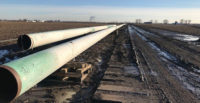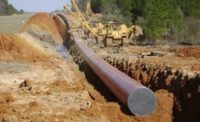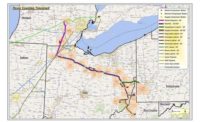Pipeline-sector observers are watching whether a U.S. appellate court ruling, which last month canceled federal approval of a $3.2-billion Florida natural-gas line and two others for not adequately considering the projects’ contribution to greenhouse-gas emissions, could affect approvals of other planned projects.
The Aug. 22 decision by the Washington, D.C., federal appeals court vacated a Federal Energy Regulatory Commission certificate, issued in early 2016, for the Southeast Market Pipelines Project, comprising the three pipelines that began operations earlier this summer. They include the 515-mile Sabal Trail pipeline, running from Alabama to near Orlando, Fla., that was developed by Spectra Energy, which Enbridge acquired last February.
Whether the pipeline must shut down until a new certificate is issued depends on how FERC and the developers proceed, Fred Jauss, a former agency attorney who now is a partner at law firm Dorsey & Whitney, told ENR. They can submit the emissions data or appeal the order, he said. The order, which becomes final in early October if it is not appealed, came in a challenge by environmental groups.
The court agreed that the agency’s environmental impact statement (EIS) did not contain information on greenhouse-gas emissions that will result from power-plant burning of gas the pipelines will carry. The agency is legally authorized to consider downstream environmental effects when evaluating an interstate pipeline application; further, at a minimum, it should have estimated the amount of power-plant carbon emissions that the three lines will produce, Judge Thomas Griffith said in the 2-1 decision.
The pipelines will deliver 1.1 billion cu ft a day to Florida. The EIS should have given a quantitative estimate of the emissions or explained why it could not, Griffith said. FERC also needed to include a discussion of the significance of those emissions and the incremental effect of adding them to other past, present and reasonably foreseeable future actions, the court said.
By quantifying the emissions, FERC could consider the total emissions from a state or region and how they contribute to regional or national emission control goals. “Without such comparisons, it is difficult to see how FERC could engage in informed decision-making with respect to the greenhouse-gas effects of this project or how informed public comment could be possible,” Griffith said. Judge Janice Brown dissented, saying FERC declined to take an in-depth look at downstream greenhouse-gas emissions because there is no link between approval of the proposed pipeline and the emissions. Jauss noted that, in the final ruling, “The court is fairly clear that FERC can engage in that kind of decision-making.”
FERC is reviewing the court’s order and its next steps, says Tamara Young-Allen, a spokeswoman. “We do not anticipate that the court’s decision will have an adverse effect on Sabal Trail’s operations at this time,” says Andrea Grover, an Enbridge spokeswoman.
U.S. Senate approval in early August of two new commissioners finally gave FERC the quorum to approve new pipelines, with one media estimate of $50 billion worth of projects in the queue. Jauss said the ruling “could further stall” some pending projects. But two major ones, Atlantic Coast and Mountain Valley, have included emissions data in FERC filings. The EIS for Atlantic Coast “included a thorough analysis of downstream gas emissions, the very analysis the court found absent from Sabal Trail’s EIS,” says a spokesman for owner Dominion Energy. FERC said the line would not significantly contribute to climate change since much of the gas will replace higher-emitting coal-fired plants, he says.
FERC’s analysis was “very thin,” says Greg Buppert, an attorney at the Southern Environmental Law Center. He says the appellate ruling’s “big takeaway was that the court is willing to send FERC back to do more work. It’s a signal we may start to see more scrutiny.” Paul Patterson, an analyst with Glenrock Associates, says the decision is “just another hurdle industry will overcome.”





Post a comment to this article
Report Abusive Comment